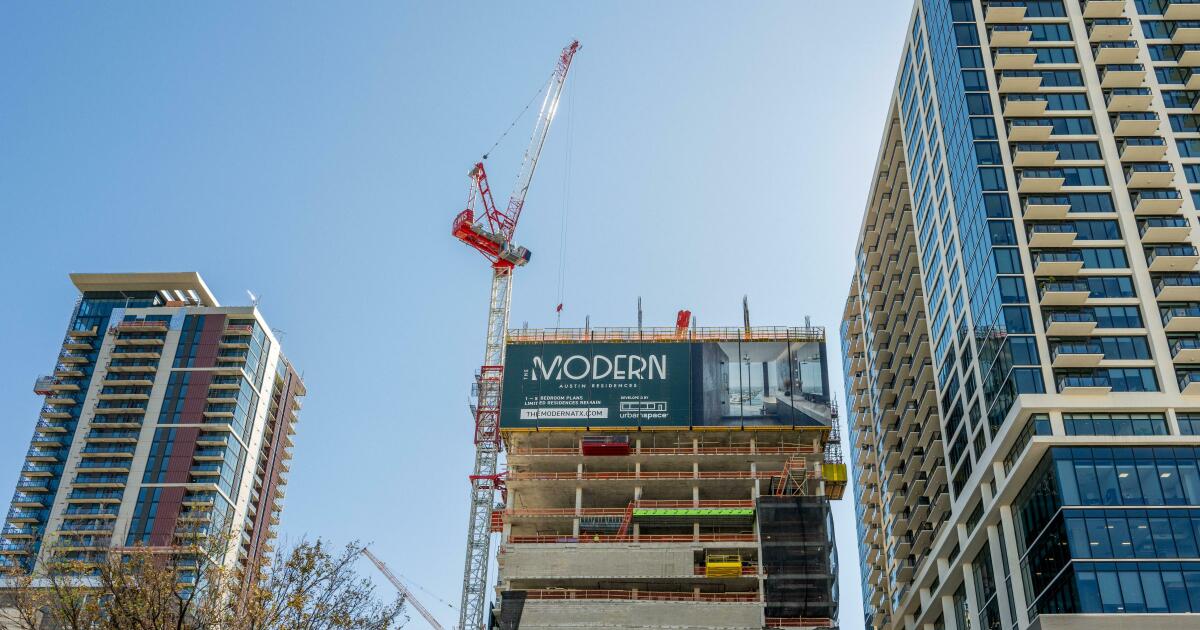The city council in Austin, Texas recently proposed something that could seem like political Kryptonite: getting rid of parking minimums.
Those are the rules that dictate how much off-street parking developers must provide — as in, a certain number of spaces for every apartment and business.
Around the country, cities are throwing out their own parking requirements – hoping to end up with less parking, more affordable housing, better transit, and walkable neighborhoods.
This sounds like it was pushed for by the development companies, not environmentalists. If this does anything except lower costs for businesses, I’ll eat my shoe.
A lot of local urbanist groups have been pushing for this for a long time. Parking minimums were largely made up by pulling numbers out of hats in the 50s and have essentially no basis in empirical fact. Countless small businesses all across the countries exist in buildings that could not legally be built today because of parking minimums. I remember a story from a small Arkansas town about some local entrepreneurs that wanted to open a cafe in a vacant downtown building, but couldn’t because they’d need to buy the adjacent building and bulldoze it to make a parking lot in order to meet parking minimums.
These also apply to residential buildings as well. If someone is wanting to build a medium sized apartment building in an older pre-war walkable area near a train station, but modern parking minimums require buying 3x the land in order to build a parking lot, that building isn’t going to happen, meaning that new housing units aren’t being built and thus there’ll be more price pressure on existing housing.
Not to mention, denser housing allows for fewer cars and more transit, which in an absolute boon for the environment. There’s a reason why suburbs emit way way more CO2 per capita that downtown areas.
I ran the numbers once; If a 1300 ft^2 house (~130 m^2) were classified as a business, it would require 4-5 parking spaces. The land used by parking ends up being equal to half the area of the building.
Environmentalists are very much in favor of getting rid of these parking minimums. The sprawling endless mega stores, impossible to walk between with massive parking lots that are never even close to filled but taking up valuable space all come from these policies. They were originally heavily pushed by auto makers on the basis of pretty much zero evidence. Less parking lots will create denser neighborhoods that are more walkable, bikeable, and improve both the efficiency and use of public transit. There will be more things nearby, lessening the need for cars or travel for simple errands to begin with. Many downtowns have been strangled by these requirements, becoming parking lot ghost towns that barely anyone lives in, killing local businesses in the end.
Here’s an environmentalist take on the issue if you don’t mind a video:
It’ll mean folks working or living at a lot of places won’t have a place to park, and without further investment into rail, bus, and bike infrastructure it means that a lot of folks simply won’t be able to work or live where they need to.
On paper, this means denser development all around. But living in most of these places requires owning a vehicle. That means you gotta have somewhere to put it. Otherwise, you’ve gotta provide alternate means for folks to get to where they need to go. Expanded bus service, more light rail, and better and more bike trails are essential.
deleted by creator
Does it increase walkability? Or does it just force residents to walk? Because those are not the same.
deleted by creator
But if there is no infrastructure to accomodate not driving, you havent made anything more walkable. Just less traversable.
Walkability isnt when cars are harder to use so you have to walk, its when a space is designed to make walking convenient. This doesnt seem to be doing anything but making one type of transport harder to use. Without making other options better, its just going to build resentment in people for losing a formerly preferred transport and being forced to use currently worse transport instead.
deleted by creator
deleted by creator
deleted by creator
deleted by creator
If it gets rid of the minimums, I’m not complaining.
I think the bigger part is it lowers the barrier to entry for others.
There are spots where, if I wanted to build a 10 br apartment complex, I’d have to have a 20 space parking lot. That means I either need more land or more construction for a parking deck. Expand that out to 100/200 units and you can quickly see where this becomes a barrier.
Not to mention, this further necessitates parking because now my nearest neighbor is further away, which could have simply been a bar or grocery store.
Now I’m not someone that can afford to build something that big, but I wouldn’t be surprised to see new builders move into the market.
I am excited to see how these cities change in the coming decades. Hopefully this helps us get better cities!
Will the use this newfound space to make the lives of the citizens or the lives of the corporations better?
I know where my bets are, on average.
Given that parking minimums (and cars in general) are a very recent development in the context of all urban history and that, last I checked, we did, in fact, have cities before the 1940s, I think it’s a pretty safe bet that this isn’t a recipe for some new corporate hellscape.
Funnily enough, parking minimums were only developed in the first place so that businesses could attract wealthy white suburbanites as they fled cities, so if you really want a social justice framing, this is essentially undoing one of the core relics of white flight.
deleted by creator
There’s one way to find out: See what the results have been in cities that have already eliminated parking minimums.
Cities are trash now, this will only make them worse because corporations are stupid. The new process will look like this:
- Buy plot of land.
- Build business without adequate parking.
- People park on the street, which will remain mysteriously legal but exacerbate the same disasters street parking already causes.
- Even with that, parking is insufficient. Business goes belly-up, causing urban blight.
- New investor goes to Step 1.
tell me you never been to a city outside the americas without saying you never been to a city outside america.
Mixed use zoning is mostly resilient on this problem. But yeah if cities don’t also fix zoning laws to ensure most destinations are accessible without cars there will be more pains.
businesses are not that stupid. They will look at how customers get there. They know that customers who drive will mostly not go there if parking is too difficult. Customers who walk (take transit…) though will be happy to have have to walk across that parking lot, so if those are your customers get rid of the parking lot to make customers happy. If customers bike, then bike parking is important. They then will make what they think is the correct trade off.
Sure if there is no parking some people who really like your business will park on the street. However unless you have a rare niche most people will just go to a competitor.
This makes cities better as excess parking - means the city is less dense and transit works best with dense cities. Just a few parking lots converted to something else where there is already density (all cities have some place dense enough for this!) makes it easier for great transit to happen in the city.
I think in some ways this will further separate the urban from the rural. Basically everyone I know works hard to avoid businesses in cities that don’t have easy parking when you have to drive in 30 miles or more to get to them. But then again, maybe for much larger cities it works, at the cost of there being different shopping and eating locations for people who live in the city within walking distance and those who need to drive. Not sure how much the “social mixing” actually helps cohesion given existing rural / urban divides, but I can see this leading to people who basically are even more in 2 completely different countries. Of course, IDK how you fix this - NYC has park and ride set up, but the vast majority of third tier cities do not, or run one bus (that no one who can possibly avoid it wants to ride) twice a day, one in and one out.
its addressing sprawl problems. Not only is parking an expensive use of space to store a vehicle but its the tip of the iceberg: the access roads become a barrier to other transportation thats quieter, less polluting and most importantly more space efficient.
the other thing that needs to happen is exceptions need to be made to zoning laws for groceries and restaurants so they can be located in residential areas.
That’s great in theory but I bet it’s just lobbying by builders who don’t want to make interested garages
It’s great in practice, too. I live in Madison, WI, where the city rescinded parking minimums several years ago. Yes, many developers were for it, exactly because they don’t want to waste space in their developments on unprofitable car storage.
However, the result has been great for everybody. One example is a restaurant that opened in my old neighborhood in a spot that would have been impossible under the old rules. It is super-popular, and often stuffed to the gills on Friday nights. Several affordable housing projects have been able to go forward as a result of lower costs from less parking, and the city passed a Transit Oriented Development zoning overlay district to encourage more. There has been some moaning from neighborhood associations about the pressure on street parking, but city studies (and my own observations) find that the street parking occupancy is very low.
Not everything that developers and corporations want is bad, and we shouldn’t condemn policies just because they want them.
I’m not saying don’t try things. I’m saying better effort would be spent on building tram or buslines or whatever. Build the alternative and things will sort out.
It sounds like in the restaurant example they just externalized the problem, and street parking is dispersed, even if you aren’t noticing it. That’s fine in one occurrence, but if all places had this policy, and no alternative transit is implemented, then street parking will be a nightmare and no one has really benefited but the builder.
The restaurant is near a popular bike path, and nestled in a neighborhood in walking distance of hundreds of houses. The city also redesigned its bus routes over this past summer to improve service. It’s also building BRT lines, which will open next year. But even if that were not the case, street parking isn’t a problem that needs to be mitigated, no? It’s a public resource deliberately built for that purpose, using tax money. If anything, more parking on the street means better utilizing existing city infrastructure. (Else, why did we build it?)
This isn’t setting a parking maximum. It just says you don’t have to build more parking than you feel like paying for. Businesses trying to attract people who drive will still be allowed to build enough parking for all their customers. However they won’t have to pay for even more than they need which is often the case now. Many parking lots are half full on the busy days, so they can replace part of that lot with another business and better use that space and save money.
Of course businesses near downtown will probably decide most customers are not driving already (traffic is bad and parking is hard to find) so why not get rid of their parking lots completely to better serve their customers. However for every rural customer (who has to drive at least part way) lost several urban customers are gained so this is worth it for them.
Right, my point isn’t that the businesses will die because there’s no rural or suburban customers, it’s that urban customers will less and less run into rural or suburban customers, leading to potentially way less interactions between different ways of life. I guess it probably doesn’t matter if rural and suburban people shop at Wal-Mart and never see a bodega and the reverse is true for urbanites, but if you never meet in a bar or whatever it means even more social bubbles than we already have. I’m not sure the idea of off street parking minimums were a smart policy though.
But a lot of rural and suburban places make themselves actively hostile to anyone that doesn’t have a car as a policy choice.
I’m not sure the rural places are actively hostile to people without a car - they’re as accessible as they were in the 1800s if you don’t have a car - a lot of hoofing miles to get somewhere. It’s a lot more practical there with a car, but I see plenty of people walking and biking where I live though usually for exercise. I’d like to see more uber / lyft but I have to guess they don’t proliferate for the same reason busses don’t go out there - not enough people using them to make it cost effective. Things like Casino complexes out in the boonies with enough draw do run special busses from cities.
Suburban is actually much worse - I’ve never seen people walking in a lot of places because that would be a death wish, same with bicycles. While I personally think Suburban is kind of the worst of both worlds, for some reason a large number of people like it but that is indeed enabled by cars.I imagine a lot of suburbanites would move to the city if cars were to go away. At least if the city was affordable.
An interesting read on the topic is The Color of Law by Richard Rothstein. The TL;DR is that an absolutely gobsmacking portion of the reason that a lot of people like the suburbs is that they were made artificially cheap and financed by government-backed loans to white people, by government policy explicitly formulated to keep minority groups out.
A lot of the rural roads have been made to allow for faster driving speeds, making these roads more dangerous for pedestrians. You also have the removal of mass transit linking these communities to cities, further cutting them off.
This is a change that needs to happen in junction with mixed use zoning, investments in public transit, and better development patterns in both urban and suburban environments to incentivise and allow people to comfortably make those trips without a car.
I do acknowledge that there will still be those who either insist on driving or don’t currently have a reasonable alternative but don’t think that our cities should be catering to them as much as they do right now with parking minimums.
don’t think that our cities should be catering to them as much as they do right now with parking minimums.
I actually agree with this in general. I’d just like to see some more park and ride or nicer big parking garages in the small cities to acknowledge that anyone from the surrounding communities has to drive to get to the city and then needs to put that car somewhere while shopping, eating, whatever. Though for the park and ride we’d need a lot more bus service from there to the city, which I guess is hard to fund.
deleted by creator
If you look at the context of my point - this is basically saying to my reading “Hell yea, we should have no contact between us righteous city dwellers and those outsiders”.
deleted by creator
You’ll get stores closer to you once it becomes impractical to drive to the center of a major urban area and park there
The same stores that closed when you built too many roads and incentivized everybody to drive 15 miles to a store
Yes, that’s a slight rewording of what I said in the beginning. Though what I would suggest is likely to happen is just less and less physical stores and more Amazon deliveries, because many small physical stores closed because they cost too much and could not price match the bigger stores or online sellers.
This will help reduce housing costs, and generally help traffic, as well as pave the way for public transport.
The article is will written and presents a number of points of view. Thank you for sharing.
The minimum parking spots per bowling lane was interesting.
deleted by creator
This allows more housing to be built on the same plot of land, which lowers the price of housing. I would venture to guess most poor people would prefer cheaper housing over guaranteed parking.
Cheaper housing doesn’t help if you can’t get a job because you can’t afford to have a car because you can’t park it. Of course the opposite is also true but our society is already biased toward car ownership
deleted by creator
I mean, in Los Angeles they just got rid of the parking requirement for ADUs, which allows many more of those to be built. I had no way to build an ADU on my property before because it required off-street parking. Now it doesn’t, so I’m beginning construction of more housing. I’m not the only one, either. I know multiple people building new properties to rent after this change.
deleted by creator











